The Impact of Quality in Supply Chain Management: A Research Study
VerifiedAdded on 2023/06/10
|96
|22967
|417
Project
AI Summary
This research project investigates the impacts of quality in supply chain management, particularly within the manufacturing sector of the United Arab Emirates. The study examines the significance of quality management frameworks on overall business performance, customer satisfaction, revenue generation, competitiveness, and sustainability. It explores the evolving importance of supply chain management in a globalized context, highlighting the need for efficiency, coordination, and cost-effectiveness. The research incorporates data from both customers and managers to assess their perceptions of quality and its impact on various aspects such as product price, delivery tracking, and after-delivery services. Findings emphasize the direct link between quality management in the supply chain and customer satisfaction, influencing profitability and long-term success. The project offers recommendations for incorporating and developing quality management strategies to enhance supply chain performance in the UAE manufacturing sector, thereby improving customer satisfaction and business outcomes. The research utilizes both quantitative and qualitative data analysis methods, including surveys and interviews, to provide a comprehensive understanding of the subject.
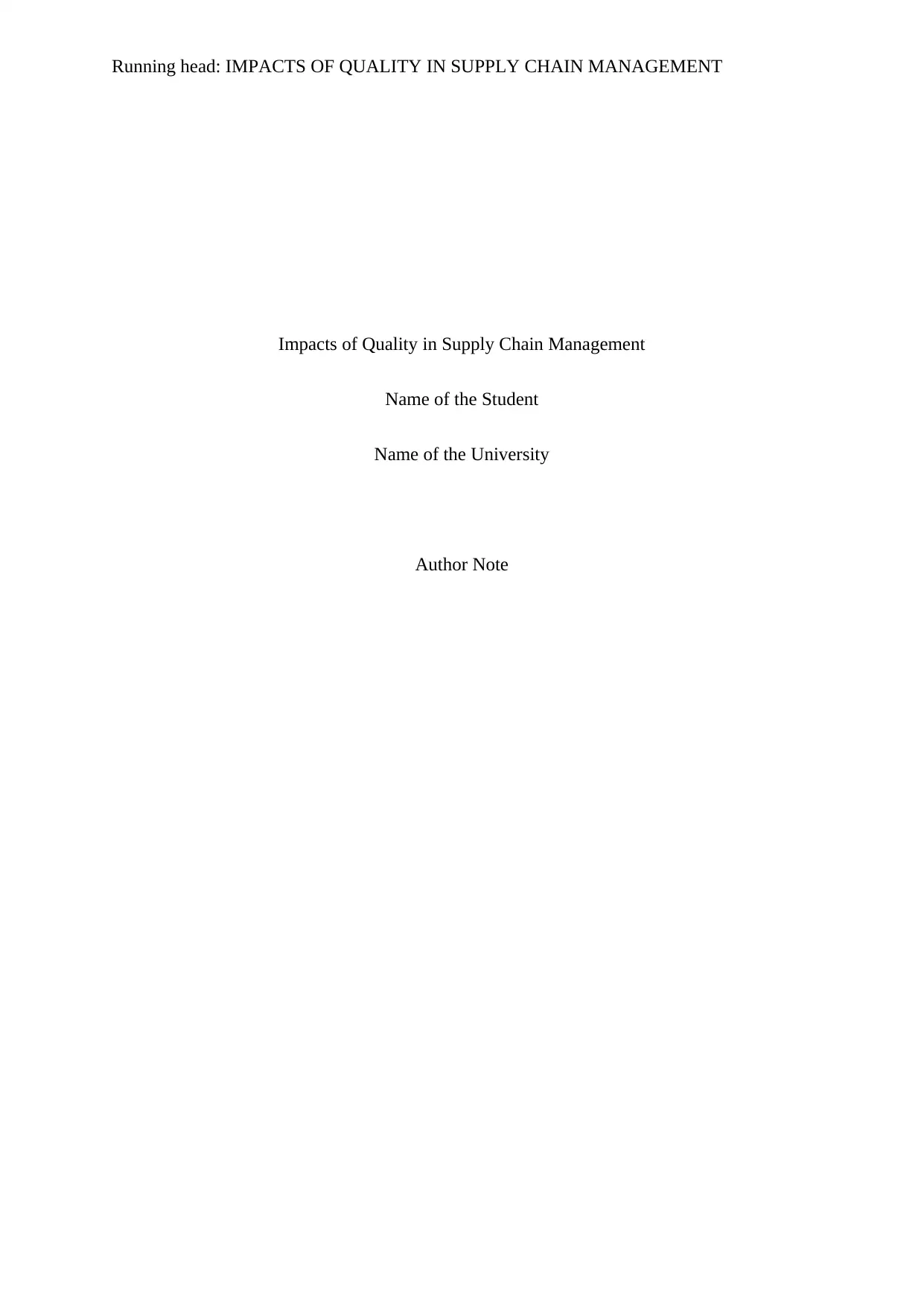
Running head: IMPACTS OF QUALITY IN SUPPLY CHAIN MANAGEMENT
Impacts of Quality in Supply Chain Management
Name of the Student
Name of the University
Author Note
Impacts of Quality in Supply Chain Management
Name of the Student
Name of the University
Author Note
Paraphrase This Document
Need a fresh take? Get an instant paraphrase of this document with our AI Paraphraser
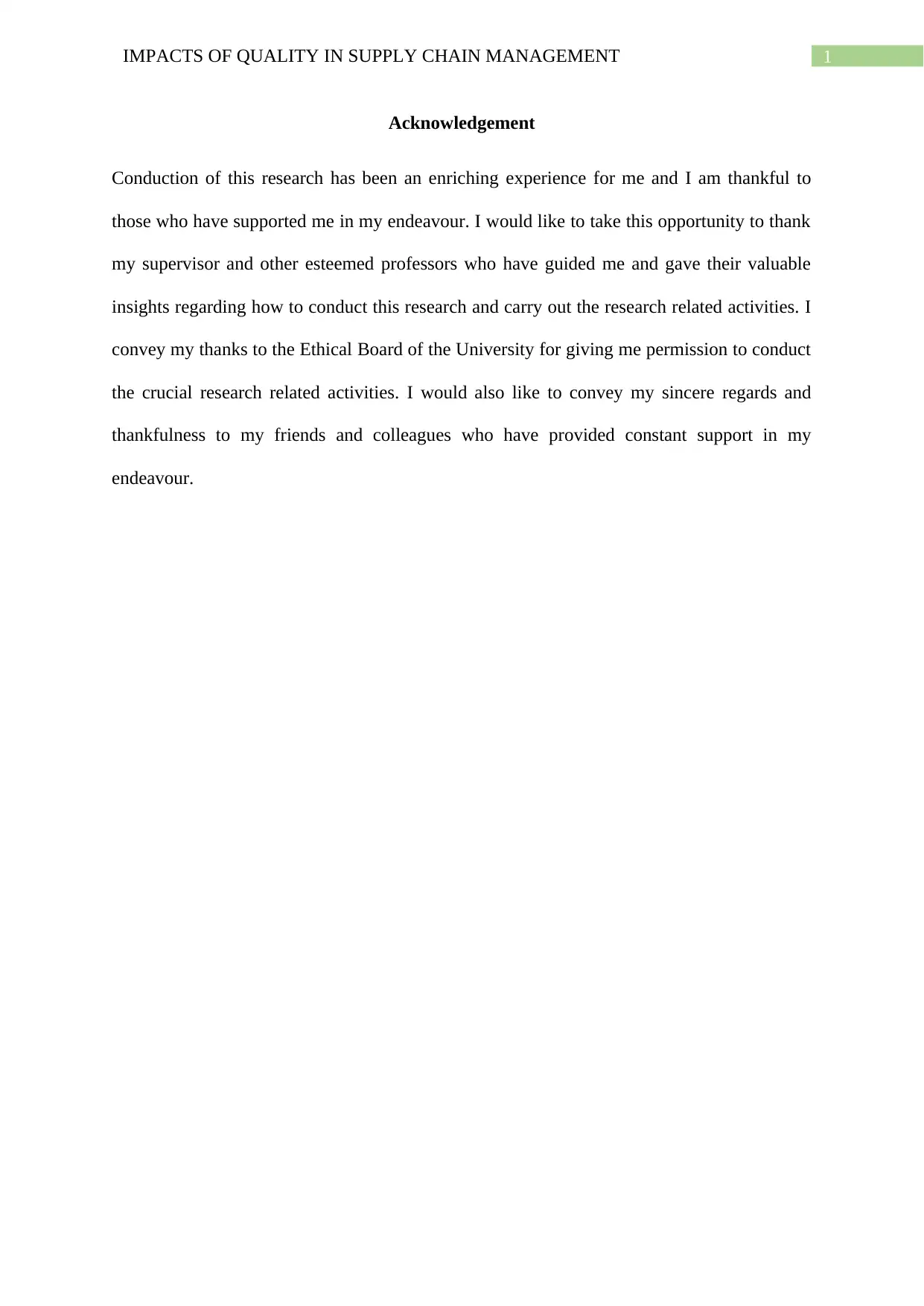
1IMPACTS OF QUALITY IN SUPPLY CHAIN MANAGEMENT
Acknowledgement
Conduction of this research has been an enriching experience for me and I am thankful to
those who have supported me in my endeavour. I would like to take this opportunity to thank
my supervisor and other esteemed professors who have guided me and gave their valuable
insights regarding how to conduct this research and carry out the research related activities. I
convey my thanks to the Ethical Board of the University for giving me permission to conduct
the crucial research related activities. I would also like to convey my sincere regards and
thankfulness to my friends and colleagues who have provided constant support in my
endeavour.
Acknowledgement
Conduction of this research has been an enriching experience for me and I am thankful to
those who have supported me in my endeavour. I would like to take this opportunity to thank
my supervisor and other esteemed professors who have guided me and gave their valuable
insights regarding how to conduct this research and carry out the research related activities. I
convey my thanks to the Ethical Board of the University for giving me permission to conduct
the crucial research related activities. I would also like to convey my sincere regards and
thankfulness to my friends and colleagues who have provided constant support in my
endeavour.
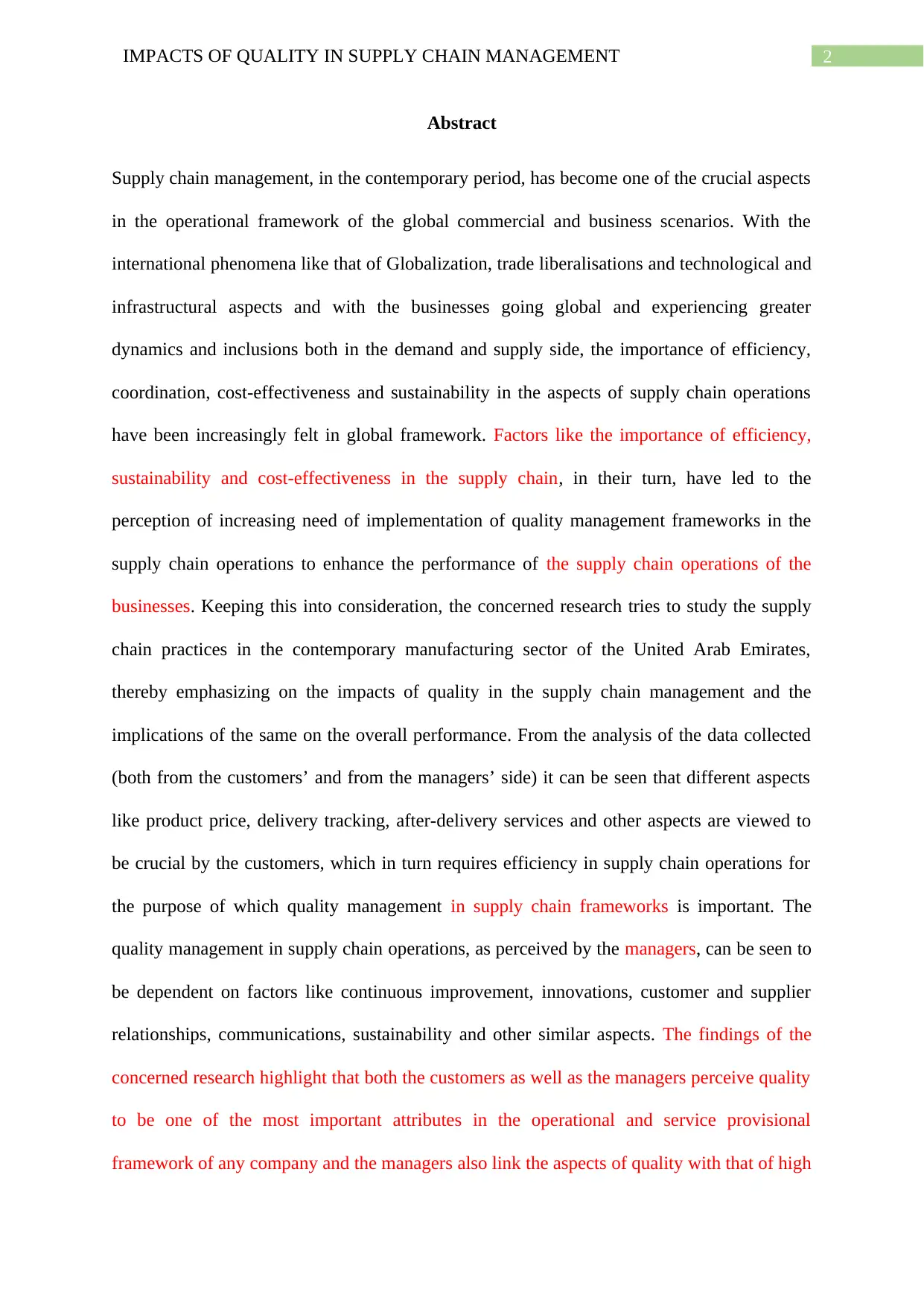
2IMPACTS OF QUALITY IN SUPPLY CHAIN MANAGEMENT
Abstract
Supply chain management, in the contemporary period, has become one of the crucial aspects
in the operational framework of the global commercial and business scenarios. With the
international phenomena like that of Globalization, trade liberalisations and technological and
infrastructural aspects and with the businesses going global and experiencing greater
dynamics and inclusions both in the demand and supply side, the importance of efficiency,
coordination, cost-effectiveness and sustainability in the aspects of supply chain operations
have been increasingly felt in global framework. Factors like the importance of efficiency,
sustainability and cost-effectiveness in the supply chain, in their turn, have led to the
perception of increasing need of implementation of quality management frameworks in the
supply chain operations to enhance the performance of the supply chain operations of the
businesses. Keeping this into consideration, the concerned research tries to study the supply
chain practices in the contemporary manufacturing sector of the United Arab Emirates,
thereby emphasizing on the impacts of quality in the supply chain management and the
implications of the same on the overall performance. From the analysis of the data collected
(both from the customers’ and from the managers’ side) it can be seen that different aspects
like product price, delivery tracking, after-delivery services and other aspects are viewed to
be crucial by the customers, which in turn requires efficiency in supply chain operations for
the purpose of which quality management in supply chain frameworks is important. The
quality management in supply chain operations, as perceived by the managers, can be seen to
be dependent on factors like continuous improvement, innovations, customer and supplier
relationships, communications, sustainability and other similar aspects. The findings of the
concerned research highlight that both the customers as well as the managers perceive quality
to be one of the most important attributes in the operational and service provisional
framework of any company and the managers also link the aspects of quality with that of high
Abstract
Supply chain management, in the contemporary period, has become one of the crucial aspects
in the operational framework of the global commercial and business scenarios. With the
international phenomena like that of Globalization, trade liberalisations and technological and
infrastructural aspects and with the businesses going global and experiencing greater
dynamics and inclusions both in the demand and supply side, the importance of efficiency,
coordination, cost-effectiveness and sustainability in the aspects of supply chain operations
have been increasingly felt in global framework. Factors like the importance of efficiency,
sustainability and cost-effectiveness in the supply chain, in their turn, have led to the
perception of increasing need of implementation of quality management frameworks in the
supply chain operations to enhance the performance of the supply chain operations of the
businesses. Keeping this into consideration, the concerned research tries to study the supply
chain practices in the contemporary manufacturing sector of the United Arab Emirates,
thereby emphasizing on the impacts of quality in the supply chain management and the
implications of the same on the overall performance. From the analysis of the data collected
(both from the customers’ and from the managers’ side) it can be seen that different aspects
like product price, delivery tracking, after-delivery services and other aspects are viewed to
be crucial by the customers, which in turn requires efficiency in supply chain operations for
the purpose of which quality management in supply chain frameworks is important. The
quality management in supply chain operations, as perceived by the managers, can be seen to
be dependent on factors like continuous improvement, innovations, customer and supplier
relationships, communications, sustainability and other similar aspects. The findings of the
concerned research highlight that both the customers as well as the managers perceive quality
to be one of the most important attributes in the operational and service provisional
framework of any company and the managers also link the aspects of quality with that of high
⊘ This is a preview!⊘
Do you want full access?
Subscribe today to unlock all pages.

Trusted by 1+ million students worldwide
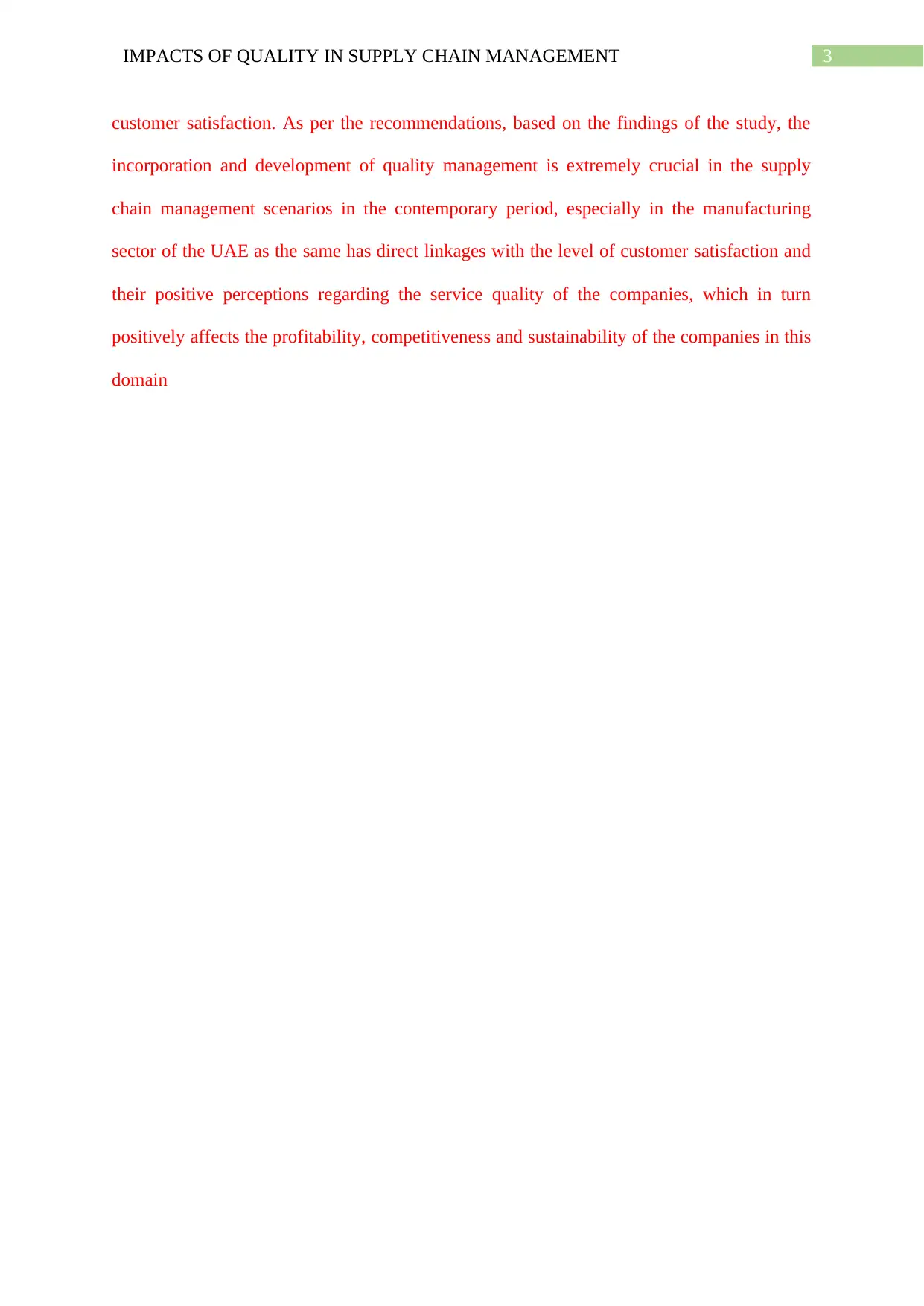
3IMPACTS OF QUALITY IN SUPPLY CHAIN MANAGEMENT
customer satisfaction. As per the recommendations, based on the findings of the study, the
incorporation and development of quality management is extremely crucial in the supply
chain management scenarios in the contemporary period, especially in the manufacturing
sector of the UAE as the same has direct linkages with the level of customer satisfaction and
their positive perceptions regarding the service quality of the companies, which in turn
positively affects the profitability, competitiveness and sustainability of the companies in this
domain
customer satisfaction. As per the recommendations, based on the findings of the study, the
incorporation and development of quality management is extremely crucial in the supply
chain management scenarios in the contemporary period, especially in the manufacturing
sector of the UAE as the same has direct linkages with the level of customer satisfaction and
their positive perceptions regarding the service quality of the companies, which in turn
positively affects the profitability, competitiveness and sustainability of the companies in this
domain
Paraphrase This Document
Need a fresh take? Get an instant paraphrase of this document with our AI Paraphraser
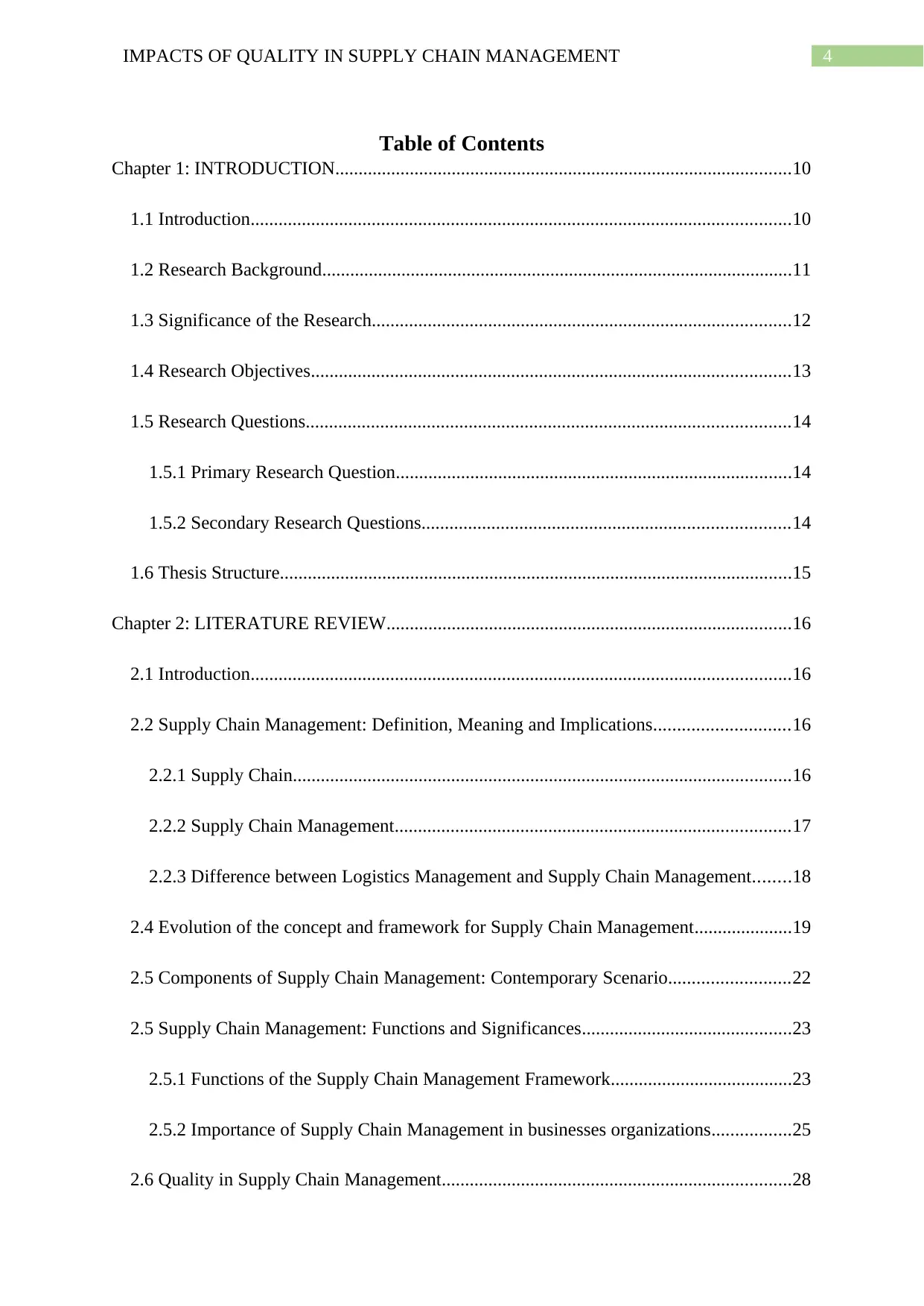
4IMPACTS OF QUALITY IN SUPPLY CHAIN MANAGEMENT
Table of Contents
Chapter 1: INTRODUCTION..................................................................................................10
1.1 Introduction....................................................................................................................10
1.2 Research Background.....................................................................................................11
1.3 Significance of the Research..........................................................................................12
1.4 Research Objectives.......................................................................................................13
1.5 Research Questions........................................................................................................14
1.5.1 Primary Research Question.....................................................................................14
1.5.2 Secondary Research Questions...............................................................................14
1.6 Thesis Structure..............................................................................................................15
Chapter 2: LITERATURE REVIEW.......................................................................................16
2.1 Introduction....................................................................................................................16
2.2 Supply Chain Management: Definition, Meaning and Implications.............................16
2.2.1 Supply Chain...........................................................................................................16
2.2.2 Supply Chain Management.....................................................................................17
2.2.3 Difference between Logistics Management and Supply Chain Management........18
2.4 Evolution of the concept and framework for Supply Chain Management.....................19
2.5 Components of Supply Chain Management: Contemporary Scenario..........................22
2.5 Supply Chain Management: Functions and Significances.............................................23
2.5.1 Functions of the Supply Chain Management Framework.......................................23
2.5.2 Importance of Supply Chain Management in businesses organizations.................25
2.6 Quality in Supply Chain Management...........................................................................28
Table of Contents
Chapter 1: INTRODUCTION..................................................................................................10
1.1 Introduction....................................................................................................................10
1.2 Research Background.....................................................................................................11
1.3 Significance of the Research..........................................................................................12
1.4 Research Objectives.......................................................................................................13
1.5 Research Questions........................................................................................................14
1.5.1 Primary Research Question.....................................................................................14
1.5.2 Secondary Research Questions...............................................................................14
1.6 Thesis Structure..............................................................................................................15
Chapter 2: LITERATURE REVIEW.......................................................................................16
2.1 Introduction....................................................................................................................16
2.2 Supply Chain Management: Definition, Meaning and Implications.............................16
2.2.1 Supply Chain...........................................................................................................16
2.2.2 Supply Chain Management.....................................................................................17
2.2.3 Difference between Logistics Management and Supply Chain Management........18
2.4 Evolution of the concept and framework for Supply Chain Management.....................19
2.5 Components of Supply Chain Management: Contemporary Scenario..........................22
2.5 Supply Chain Management: Functions and Significances.............................................23
2.5.1 Functions of the Supply Chain Management Framework.......................................23
2.5.2 Importance of Supply Chain Management in businesses organizations.................25
2.6 Quality in Supply Chain Management...........................................................................28
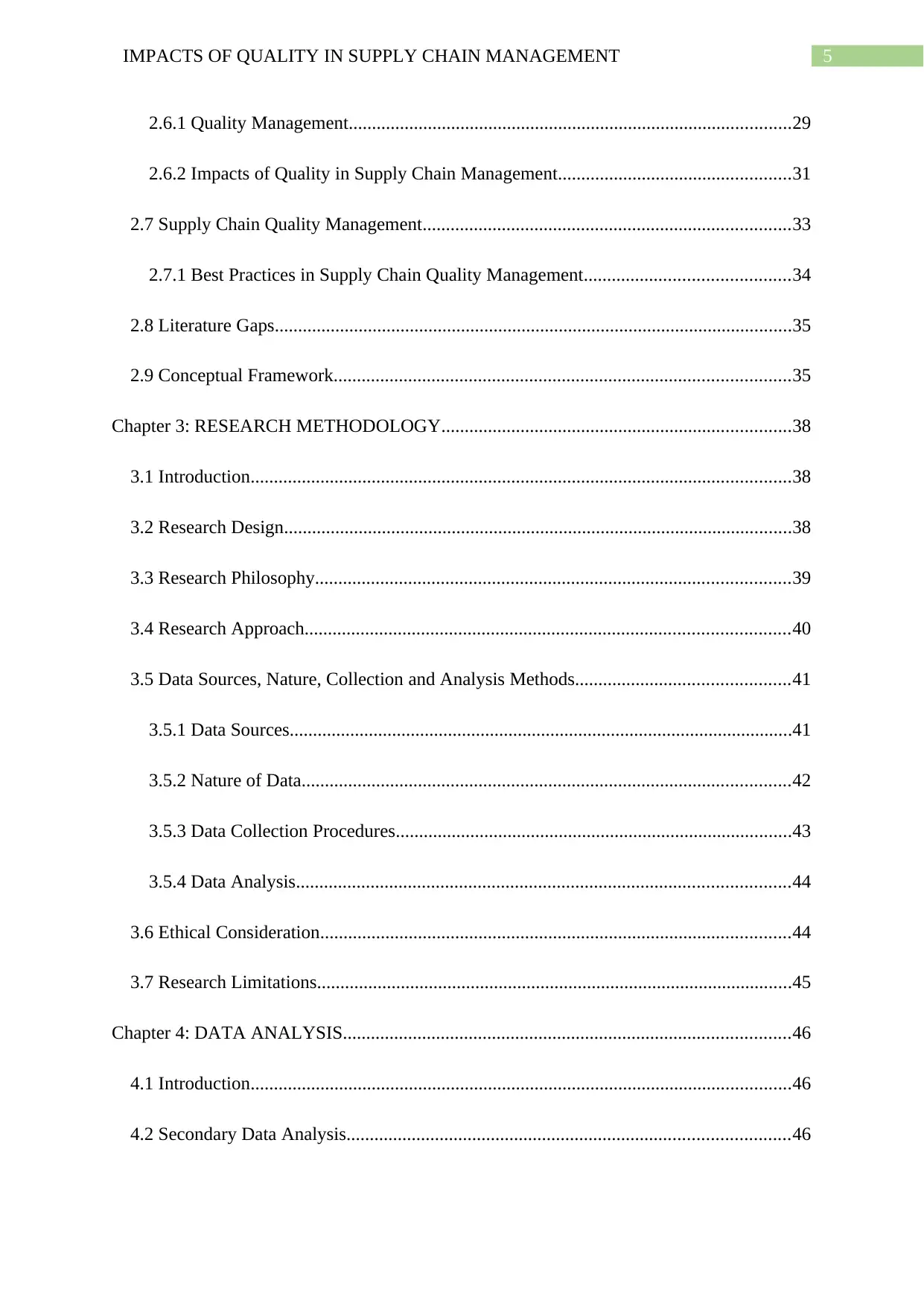
5IMPACTS OF QUALITY IN SUPPLY CHAIN MANAGEMENT
2.6.1 Quality Management...............................................................................................29
2.6.2 Impacts of Quality in Supply Chain Management..................................................31
2.7 Supply Chain Quality Management...............................................................................33
2.7.1 Best Practices in Supply Chain Quality Management............................................34
2.8 Literature Gaps...............................................................................................................35
2.9 Conceptual Framework..................................................................................................35
Chapter 3: RESEARCH METHODOLOGY...........................................................................38
3.1 Introduction....................................................................................................................38
3.2 Research Design.............................................................................................................38
3.3 Research Philosophy......................................................................................................39
3.4 Research Approach........................................................................................................40
3.5 Data Sources, Nature, Collection and Analysis Methods..............................................41
3.5.1 Data Sources............................................................................................................41
3.5.2 Nature of Data.........................................................................................................42
3.5.3 Data Collection Procedures.....................................................................................43
3.5.4 Data Analysis..........................................................................................................44
3.6 Ethical Consideration.....................................................................................................44
3.7 Research Limitations......................................................................................................45
Chapter 4: DATA ANALYSIS................................................................................................46
4.1 Introduction....................................................................................................................46
4.2 Secondary Data Analysis...............................................................................................46
2.6.1 Quality Management...............................................................................................29
2.6.2 Impacts of Quality in Supply Chain Management..................................................31
2.7 Supply Chain Quality Management...............................................................................33
2.7.1 Best Practices in Supply Chain Quality Management............................................34
2.8 Literature Gaps...............................................................................................................35
2.9 Conceptual Framework..................................................................................................35
Chapter 3: RESEARCH METHODOLOGY...........................................................................38
3.1 Introduction....................................................................................................................38
3.2 Research Design.............................................................................................................38
3.3 Research Philosophy......................................................................................................39
3.4 Research Approach........................................................................................................40
3.5 Data Sources, Nature, Collection and Analysis Methods..............................................41
3.5.1 Data Sources............................................................................................................41
3.5.2 Nature of Data.........................................................................................................42
3.5.3 Data Collection Procedures.....................................................................................43
3.5.4 Data Analysis..........................................................................................................44
3.6 Ethical Consideration.....................................................................................................44
3.7 Research Limitations......................................................................................................45
Chapter 4: DATA ANALYSIS................................................................................................46
4.1 Introduction....................................................................................................................46
4.2 Secondary Data Analysis...............................................................................................46
⊘ This is a preview!⊘
Do you want full access?
Subscribe today to unlock all pages.

Trusted by 1+ million students worldwide
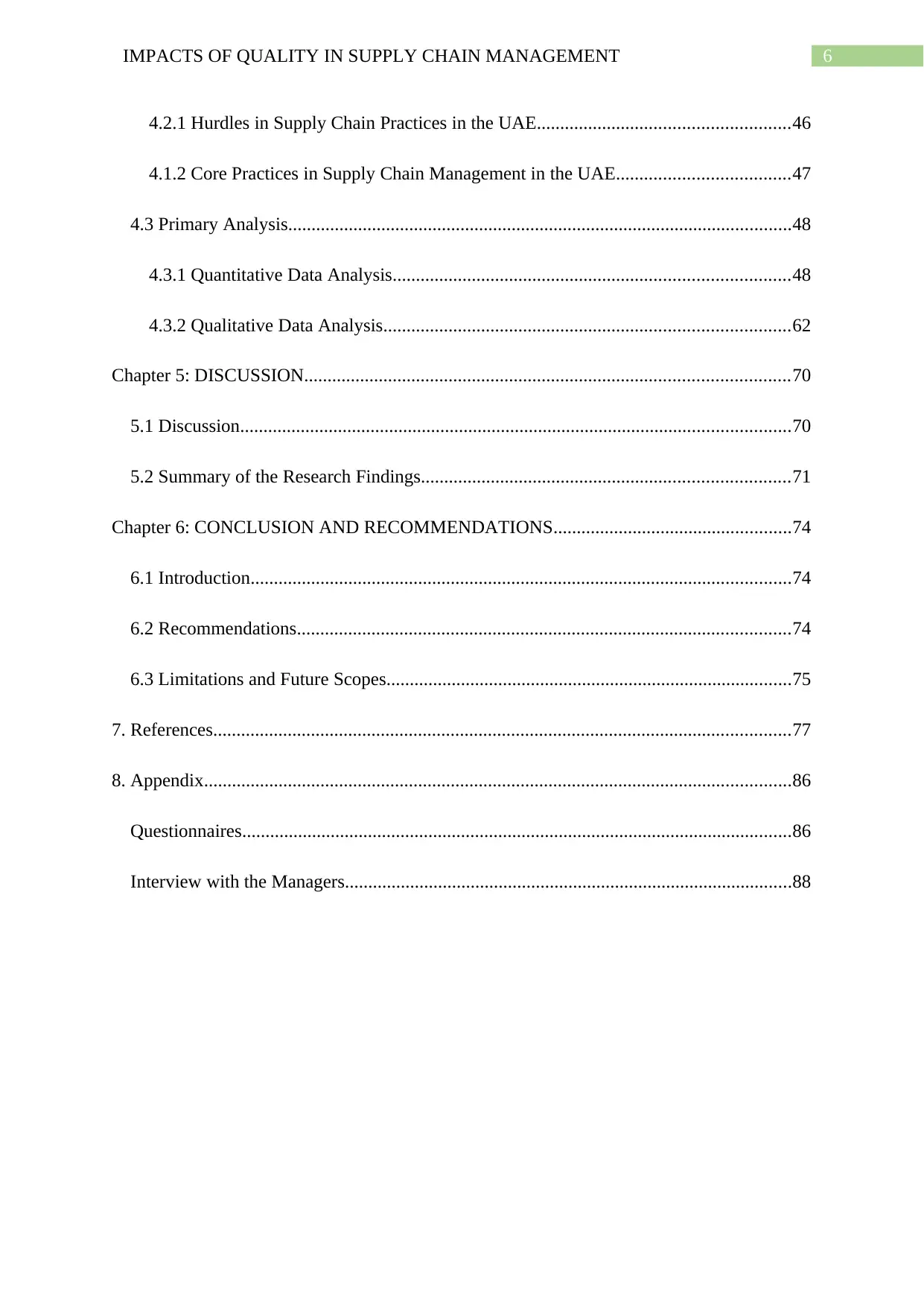
6IMPACTS OF QUALITY IN SUPPLY CHAIN MANAGEMENT
4.2.1 Hurdles in Supply Chain Practices in the UAE......................................................46
4.1.2 Core Practices in Supply Chain Management in the UAE.....................................47
4.3 Primary Analysis............................................................................................................48
4.3.1 Quantitative Data Analysis.....................................................................................48
4.3.2 Qualitative Data Analysis.......................................................................................62
Chapter 5: DISCUSSION........................................................................................................70
5.1 Discussion......................................................................................................................70
5.2 Summary of the Research Findings...............................................................................71
Chapter 6: CONCLUSION AND RECOMMENDATIONS...................................................74
6.1 Introduction....................................................................................................................74
6.2 Recommendations..........................................................................................................74
6.3 Limitations and Future Scopes.......................................................................................75
7. References............................................................................................................................77
8. Appendix..............................................................................................................................86
Questionnaires......................................................................................................................86
Interview with the Managers................................................................................................88
4.2.1 Hurdles in Supply Chain Practices in the UAE......................................................46
4.1.2 Core Practices in Supply Chain Management in the UAE.....................................47
4.3 Primary Analysis............................................................................................................48
4.3.1 Quantitative Data Analysis.....................................................................................48
4.3.2 Qualitative Data Analysis.......................................................................................62
Chapter 5: DISCUSSION........................................................................................................70
5.1 Discussion......................................................................................................................70
5.2 Summary of the Research Findings...............................................................................71
Chapter 6: CONCLUSION AND RECOMMENDATIONS...................................................74
6.1 Introduction....................................................................................................................74
6.2 Recommendations..........................................................................................................74
6.3 Limitations and Future Scopes.......................................................................................75
7. References............................................................................................................................77
8. Appendix..............................................................................................................................86
Questionnaires......................................................................................................................86
Interview with the Managers................................................................................................88
Paraphrase This Document
Need a fresh take? Get an instant paraphrase of this document with our AI Paraphraser
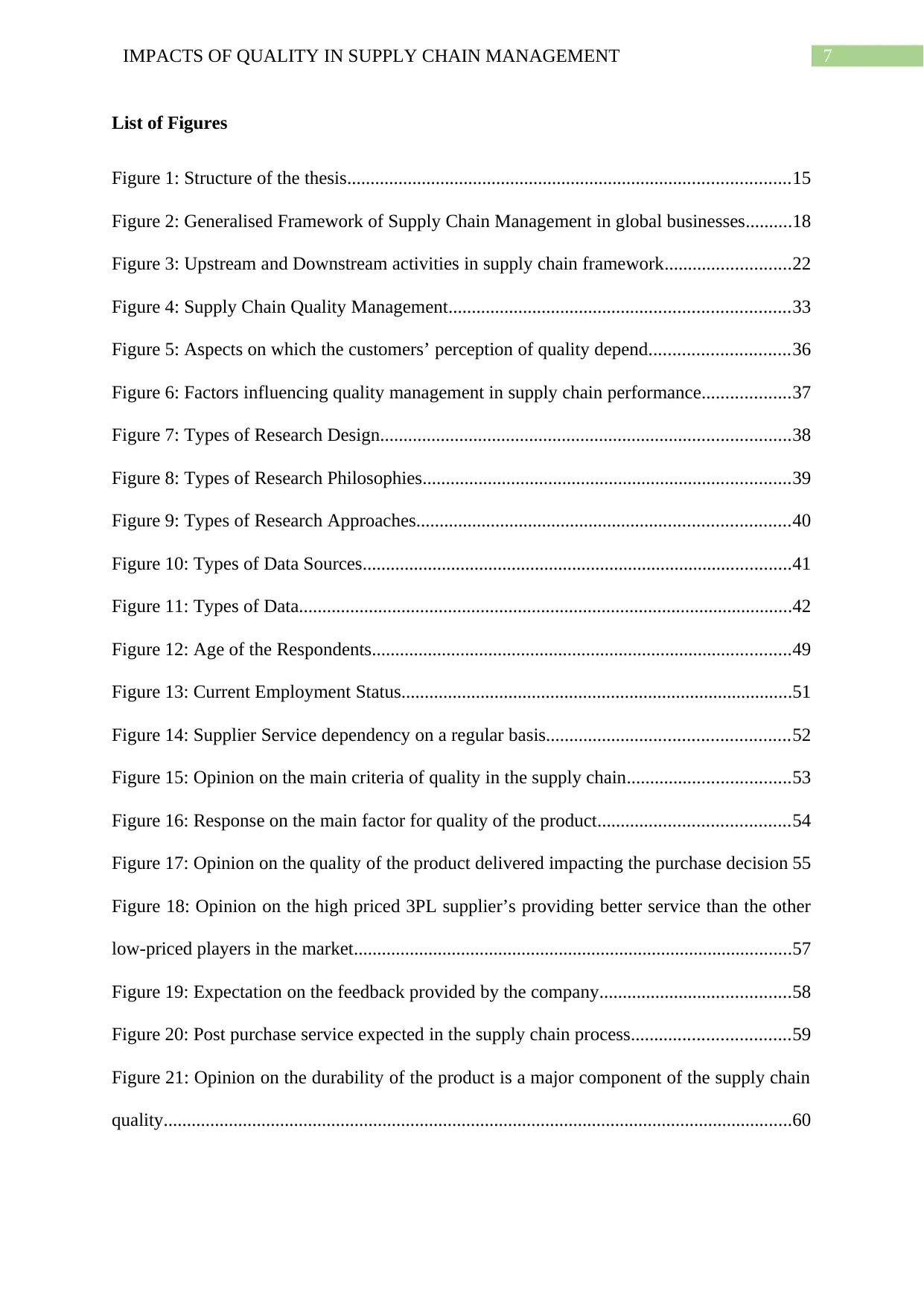
7IMPACTS OF QUALITY IN SUPPLY CHAIN MANAGEMENT
List of Figures
Figure 1: Structure of the thesis...............................................................................................15
Figure 2: Generalised Framework of Supply Chain Management in global businesses..........18
Figure 3: Upstream and Downstream activities in supply chain framework...........................22
Figure 4: Supply Chain Quality Management.........................................................................33
Figure 5: Aspects on which the customers’ perception of quality depend..............................36
Figure 6: Factors influencing quality management in supply chain performance...................37
Figure 7: Types of Research Design........................................................................................38
Figure 8: Types of Research Philosophies...............................................................................39
Figure 9: Types of Research Approaches................................................................................40
Figure 10: Types of Data Sources............................................................................................41
Figure 11: Types of Data..........................................................................................................42
Figure 12: Age of the Respondents..........................................................................................49
Figure 13: Current Employment Status....................................................................................51
Figure 14: Supplier Service dependency on a regular basis....................................................52
Figure 15: Opinion on the main criteria of quality in the supply chain...................................53
Figure 16: Response on the main factor for quality of the product.........................................54
Figure 17: Opinion on the quality of the product delivered impacting the purchase decision 55
Figure 18: Opinion on the high priced 3PL supplier’s providing better service than the other
low-priced players in the market..............................................................................................57
Figure 19: Expectation on the feedback provided by the company.........................................58
Figure 20: Post purchase service expected in the supply chain process..................................59
Figure 21: Opinion on the durability of the product is a major component of the supply chain
quality.......................................................................................................................................60
List of Figures
Figure 1: Structure of the thesis...............................................................................................15
Figure 2: Generalised Framework of Supply Chain Management in global businesses..........18
Figure 3: Upstream and Downstream activities in supply chain framework...........................22
Figure 4: Supply Chain Quality Management.........................................................................33
Figure 5: Aspects on which the customers’ perception of quality depend..............................36
Figure 6: Factors influencing quality management in supply chain performance...................37
Figure 7: Types of Research Design........................................................................................38
Figure 8: Types of Research Philosophies...............................................................................39
Figure 9: Types of Research Approaches................................................................................40
Figure 10: Types of Data Sources............................................................................................41
Figure 11: Types of Data..........................................................................................................42
Figure 12: Age of the Respondents..........................................................................................49
Figure 13: Current Employment Status....................................................................................51
Figure 14: Supplier Service dependency on a regular basis....................................................52
Figure 15: Opinion on the main criteria of quality in the supply chain...................................53
Figure 16: Response on the main factor for quality of the product.........................................54
Figure 17: Opinion on the quality of the product delivered impacting the purchase decision 55
Figure 18: Opinion on the high priced 3PL supplier’s providing better service than the other
low-priced players in the market..............................................................................................57
Figure 19: Expectation on the feedback provided by the company.........................................58
Figure 20: Post purchase service expected in the supply chain process..................................59
Figure 21: Opinion on the durability of the product is a major component of the supply chain
quality.......................................................................................................................................60
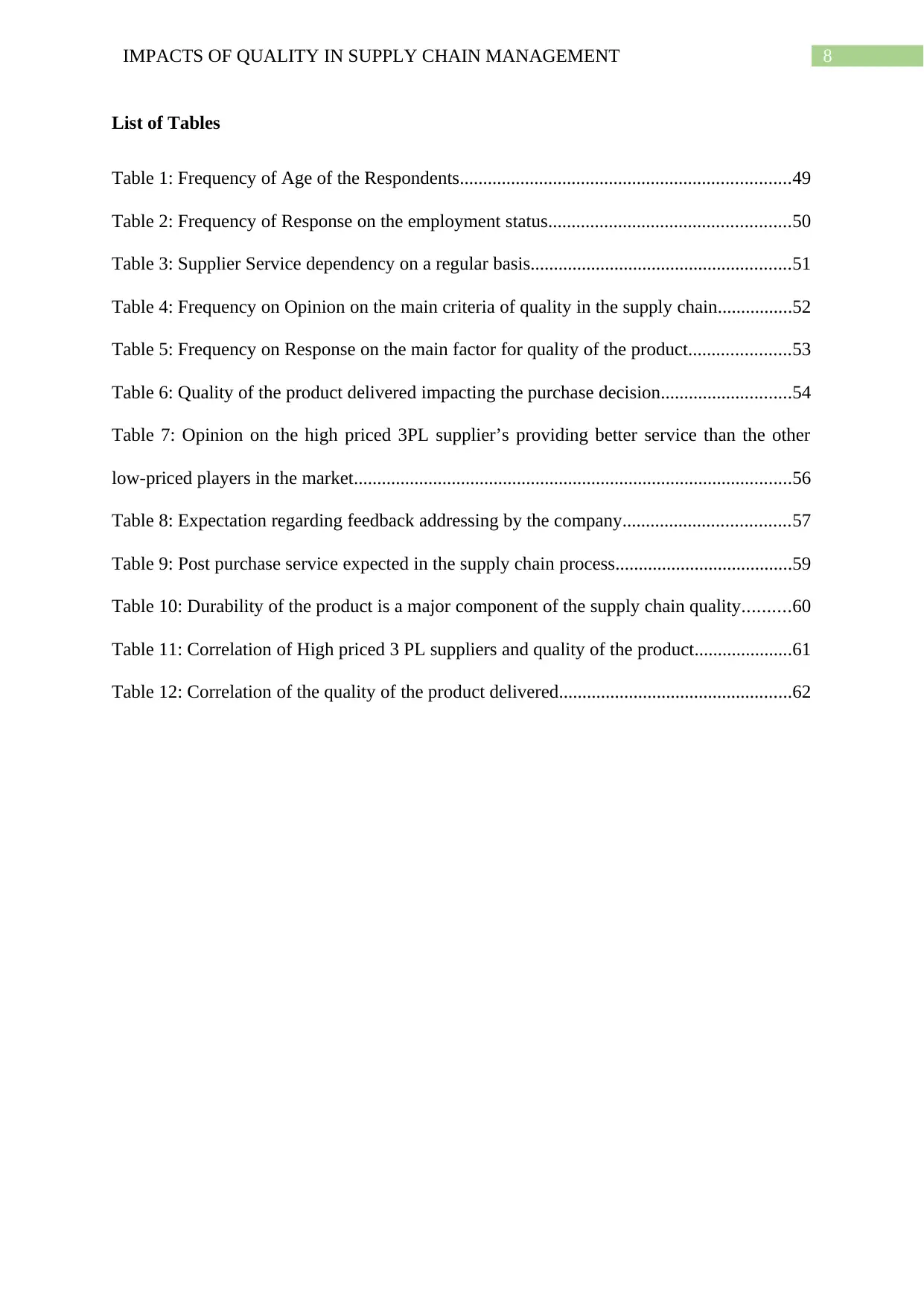
8IMPACTS OF QUALITY IN SUPPLY CHAIN MANAGEMENT
List of Tables
Table 1: Frequency of Age of the Respondents.......................................................................49
Table 2: Frequency of Response on the employment status....................................................50
Table 3: Supplier Service dependency on a regular basis........................................................51
Table 4: Frequency on Opinion on the main criteria of quality in the supply chain................52
Table 5: Frequency on Response on the main factor for quality of the product......................53
Table 6: Quality of the product delivered impacting the purchase decision............................54
Table 7: Opinion on the high priced 3PL supplier’s providing better service than the other
low-priced players in the market..............................................................................................56
Table 8: Expectation regarding feedback addressing by the company....................................57
Table 9: Post purchase service expected in the supply chain process......................................59
Table 10: Durability of the product is a major component of the supply chain quality..........60
Table 11: Correlation of High priced 3 PL suppliers and quality of the product.....................61
Table 12: Correlation of the quality of the product delivered..................................................62
List of Tables
Table 1: Frequency of Age of the Respondents.......................................................................49
Table 2: Frequency of Response on the employment status....................................................50
Table 3: Supplier Service dependency on a regular basis........................................................51
Table 4: Frequency on Opinion on the main criteria of quality in the supply chain................52
Table 5: Frequency on Response on the main factor for quality of the product......................53
Table 6: Quality of the product delivered impacting the purchase decision............................54
Table 7: Opinion on the high priced 3PL supplier’s providing better service than the other
low-priced players in the market..............................................................................................56
Table 8: Expectation regarding feedback addressing by the company....................................57
Table 9: Post purchase service expected in the supply chain process......................................59
Table 10: Durability of the product is a major component of the supply chain quality..........60
Table 11: Correlation of High priced 3 PL suppliers and quality of the product.....................61
Table 12: Correlation of the quality of the product delivered..................................................62
⊘ This is a preview!⊘
Do you want full access?
Subscribe today to unlock all pages.

Trusted by 1+ million students worldwide
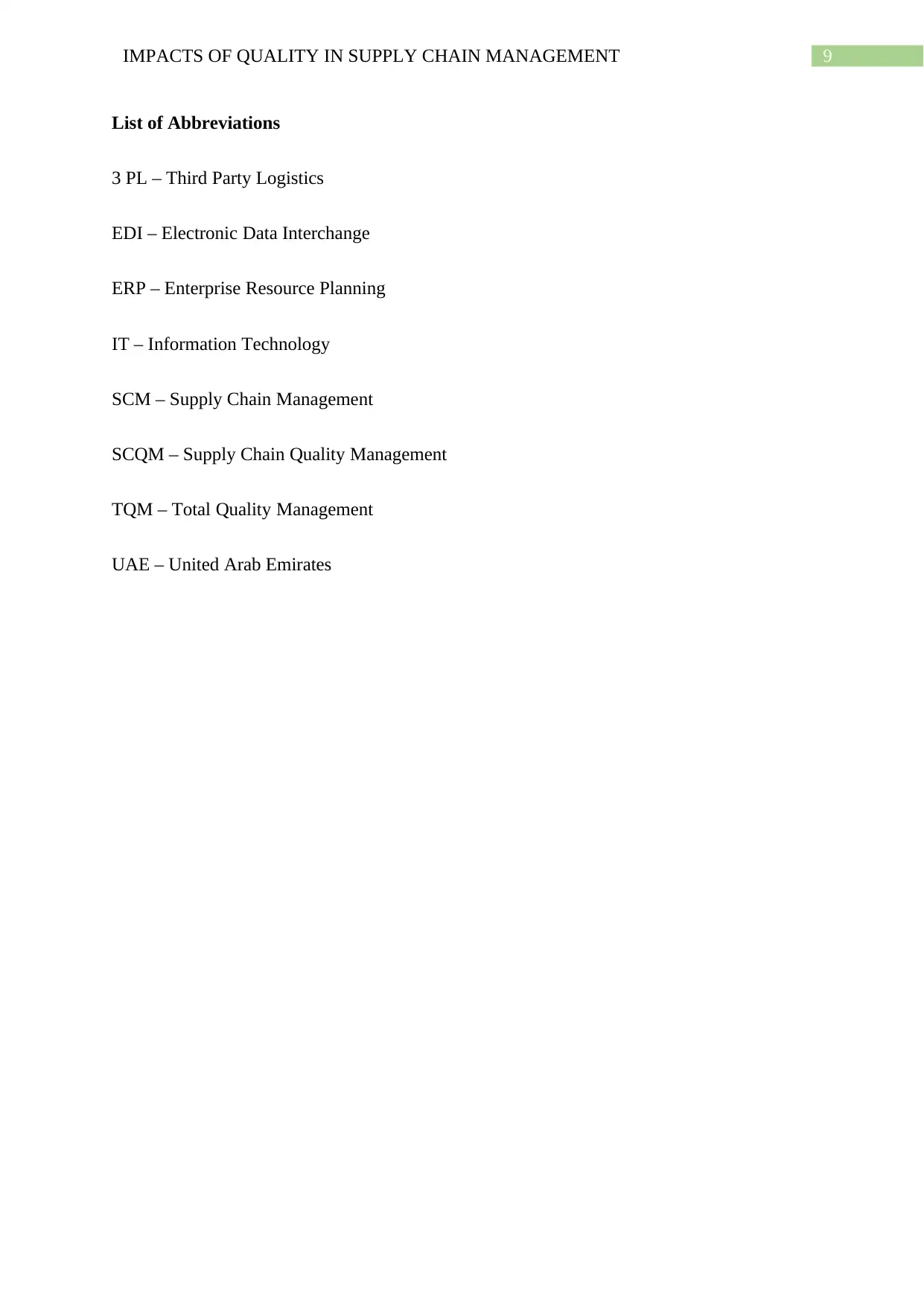
9IMPACTS OF QUALITY IN SUPPLY CHAIN MANAGEMENT
List of Abbreviations
3 PL – Third Party Logistics
EDI – Electronic Data Interchange
ERP – Enterprise Resource Planning
IT – Information Technology
SCM – Supply Chain Management
SCQM – Supply Chain Quality Management
TQM – Total Quality Management
UAE – United Arab Emirates
List of Abbreviations
3 PL – Third Party Logistics
EDI – Electronic Data Interchange
ERP – Enterprise Resource Planning
IT – Information Technology
SCM – Supply Chain Management
SCQM – Supply Chain Quality Management
TQM – Total Quality Management
UAE – United Arab Emirates
Paraphrase This Document
Need a fresh take? Get an instant paraphrase of this document with our AI Paraphraser
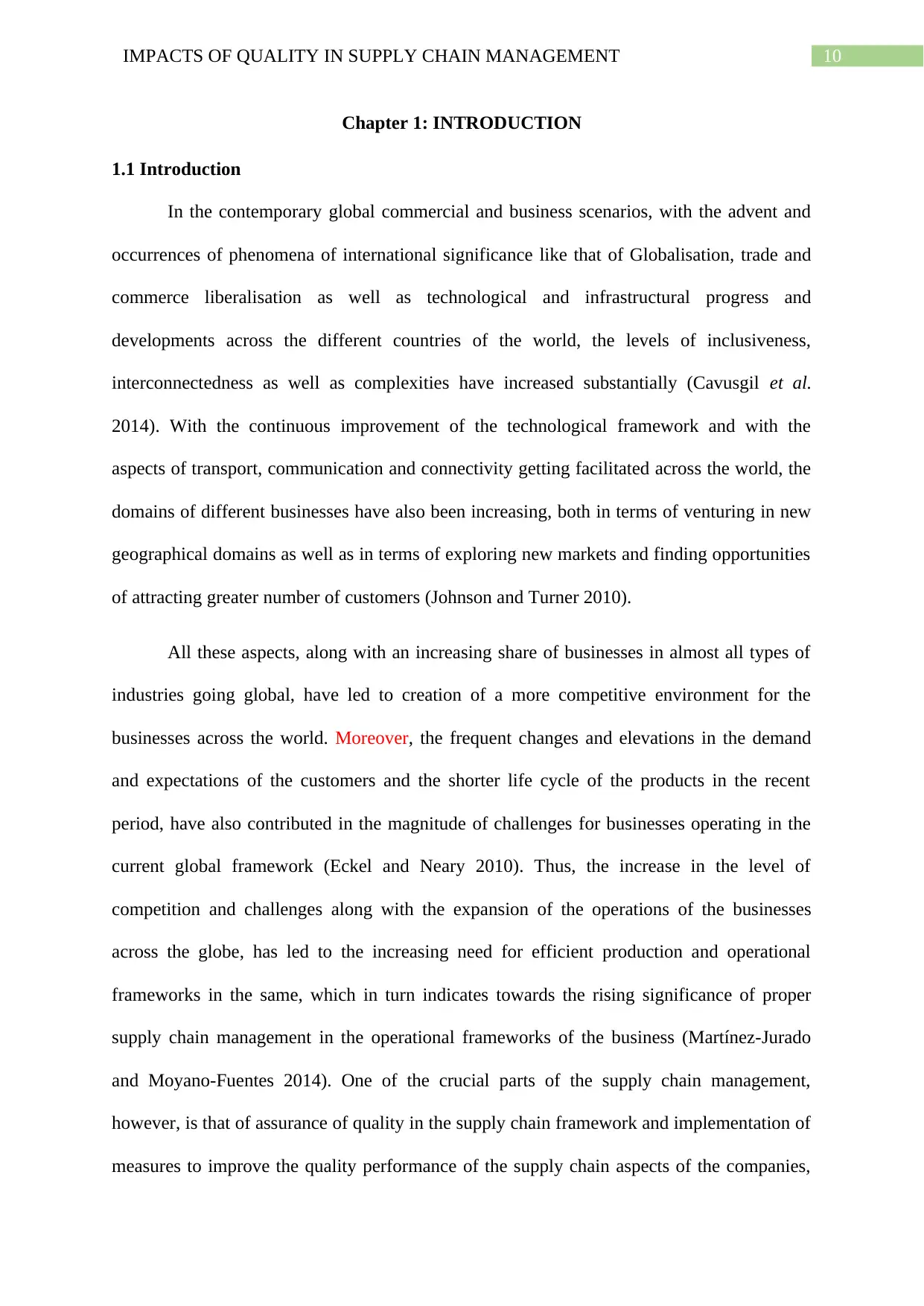
10IMPACTS OF QUALITY IN SUPPLY CHAIN MANAGEMENT
Chapter 1: INTRODUCTION
1.1 Introduction
In the contemporary global commercial and business scenarios, with the advent and
occurrences of phenomena of international significance like that of Globalisation, trade and
commerce liberalisation as well as technological and infrastructural progress and
developments across the different countries of the world, the levels of inclusiveness,
interconnectedness as well as complexities have increased substantially (Cavusgil et al.
2014). With the continuous improvement of the technological framework and with the
aspects of transport, communication and connectivity getting facilitated across the world, the
domains of different businesses have also been increasing, both in terms of venturing in new
geographical domains as well as in terms of exploring new markets and finding opportunities
of attracting greater number of customers (Johnson and Turner 2010).
All these aspects, along with an increasing share of businesses in almost all types of
industries going global, have led to creation of a more competitive environment for the
businesses across the world. Moreover, the frequent changes and elevations in the demand
and expectations of the customers and the shorter life cycle of the products in the recent
period, have also contributed in the magnitude of challenges for businesses operating in the
current global framework (Eckel and Neary 2010). Thus, the increase in the level of
competition and challenges along with the expansion of the operations of the businesses
across the globe, has led to the increasing need for efficient production and operational
frameworks in the same, which in turn indicates towards the rising significance of proper
supply chain management in the operational frameworks of the business (Martínez-Jurado
and Moyano-Fuentes 2014). One of the crucial parts of the supply chain management,
however, is that of assurance of quality in the supply chain framework and implementation of
measures to improve the quality performance of the supply chain aspects of the companies,
Chapter 1: INTRODUCTION
1.1 Introduction
In the contemporary global commercial and business scenarios, with the advent and
occurrences of phenomena of international significance like that of Globalisation, trade and
commerce liberalisation as well as technological and infrastructural progress and
developments across the different countries of the world, the levels of inclusiveness,
interconnectedness as well as complexities have increased substantially (Cavusgil et al.
2014). With the continuous improvement of the technological framework and with the
aspects of transport, communication and connectivity getting facilitated across the world, the
domains of different businesses have also been increasing, both in terms of venturing in new
geographical domains as well as in terms of exploring new markets and finding opportunities
of attracting greater number of customers (Johnson and Turner 2010).
All these aspects, along with an increasing share of businesses in almost all types of
industries going global, have led to creation of a more competitive environment for the
businesses across the world. Moreover, the frequent changes and elevations in the demand
and expectations of the customers and the shorter life cycle of the products in the recent
period, have also contributed in the magnitude of challenges for businesses operating in the
current global framework (Eckel and Neary 2010). Thus, the increase in the level of
competition and challenges along with the expansion of the operations of the businesses
across the globe, has led to the increasing need for efficient production and operational
frameworks in the same, which in turn indicates towards the rising significance of proper
supply chain management in the operational frameworks of the business (Martínez-Jurado
and Moyano-Fuentes 2014). One of the crucial parts of the supply chain management,
however, is that of assurance of quality in the supply chain framework and implementation of
measures to improve the quality performance of the supply chain aspects of the companies,
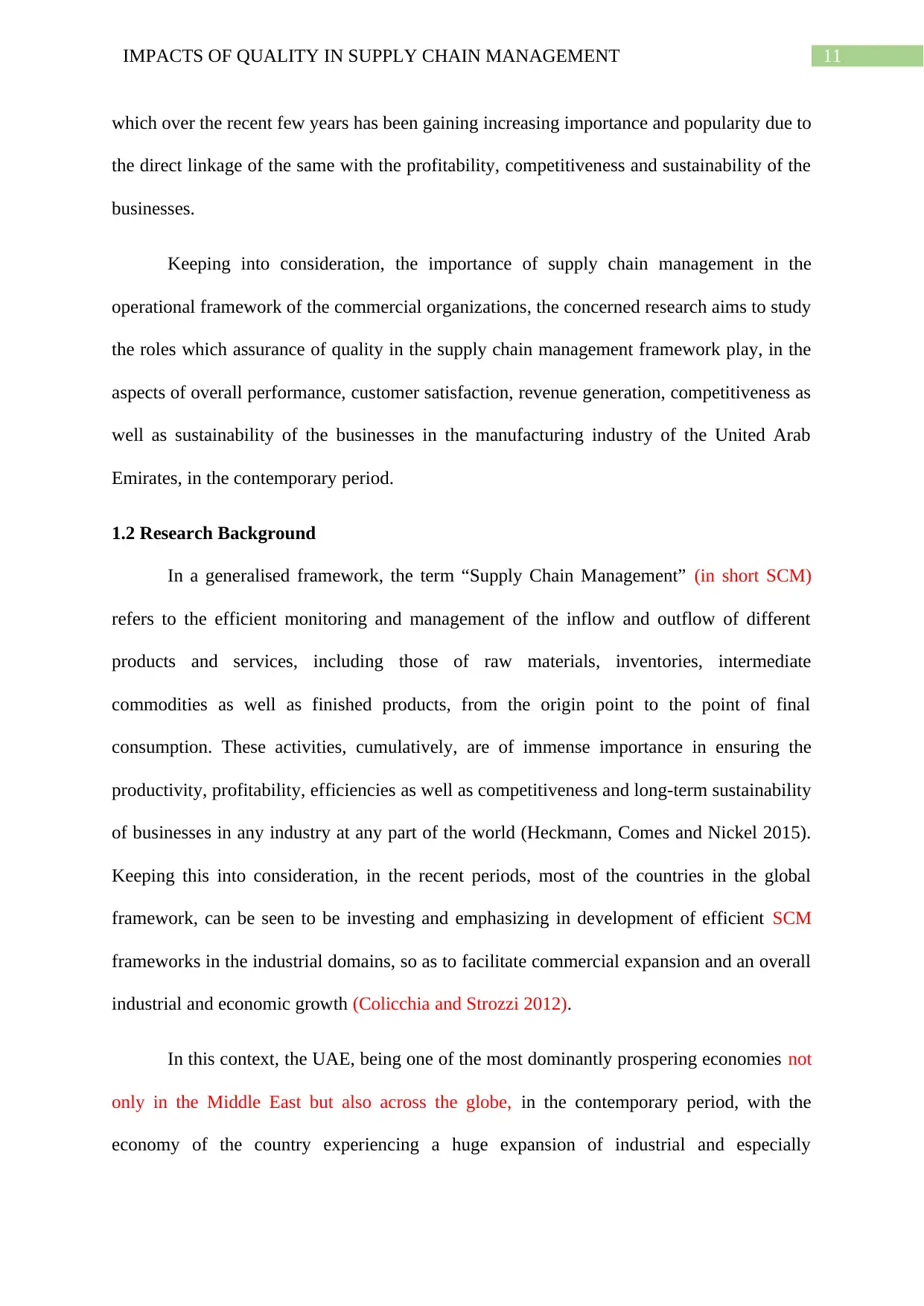
11IMPACTS OF QUALITY IN SUPPLY CHAIN MANAGEMENT
which over the recent few years has been gaining increasing importance and popularity due to
the direct linkage of the same with the profitability, competitiveness and sustainability of the
businesses.
Keeping into consideration, the importance of supply chain management in the
operational framework of the commercial organizations, the concerned research aims to study
the roles which assurance of quality in the supply chain management framework play, in the
aspects of overall performance, customer satisfaction, revenue generation, competitiveness as
well as sustainability of the businesses in the manufacturing industry of the United Arab
Emirates, in the contemporary period.
1.2 Research Background
In a generalised framework, the term “Supply Chain Management” (in short SCM)
refers to the efficient monitoring and management of the inflow and outflow of different
products and services, including those of raw materials, inventories, intermediate
commodities as well as finished products, from the origin point to the point of final
consumption. These activities, cumulatively, are of immense importance in ensuring the
productivity, profitability, efficiencies as well as competitiveness and long-term sustainability
of businesses in any industry at any part of the world (Heckmann, Comes and Nickel 2015).
Keeping this into consideration, in the recent periods, most of the countries in the global
framework, can be seen to be investing and emphasizing in development of efficient SCM
frameworks in the industrial domains, so as to facilitate commercial expansion and an overall
industrial and economic growth (Colicchia and Strozzi 2012).
In this context, the UAE, being one of the most dominantly prospering economies not
only in the Middle East but also across the globe, in the contemporary period, with the
economy of the country experiencing a huge expansion of industrial and especially
which over the recent few years has been gaining increasing importance and popularity due to
the direct linkage of the same with the profitability, competitiveness and sustainability of the
businesses.
Keeping into consideration, the importance of supply chain management in the
operational framework of the commercial organizations, the concerned research aims to study
the roles which assurance of quality in the supply chain management framework play, in the
aspects of overall performance, customer satisfaction, revenue generation, competitiveness as
well as sustainability of the businesses in the manufacturing industry of the United Arab
Emirates, in the contemporary period.
1.2 Research Background
In a generalised framework, the term “Supply Chain Management” (in short SCM)
refers to the efficient monitoring and management of the inflow and outflow of different
products and services, including those of raw materials, inventories, intermediate
commodities as well as finished products, from the origin point to the point of final
consumption. These activities, cumulatively, are of immense importance in ensuring the
productivity, profitability, efficiencies as well as competitiveness and long-term sustainability
of businesses in any industry at any part of the world (Heckmann, Comes and Nickel 2015).
Keeping this into consideration, in the recent periods, most of the countries in the global
framework, can be seen to be investing and emphasizing in development of efficient SCM
frameworks in the industrial domains, so as to facilitate commercial expansion and an overall
industrial and economic growth (Colicchia and Strozzi 2012).
In this context, the UAE, being one of the most dominantly prospering economies not
only in the Middle East but also across the globe, in the contemporary period, with the
economy of the country experiencing a huge expansion of industrial and especially
⊘ This is a preview!⊘
Do you want full access?
Subscribe today to unlock all pages.

Trusted by 1+ million students worldwide
1 out of 96
Related Documents
Your All-in-One AI-Powered Toolkit for Academic Success.
+13062052269
info@desklib.com
Available 24*7 on WhatsApp / Email
![[object Object]](/_next/static/media/star-bottom.7253800d.svg)
Unlock your academic potential
Copyright © 2020–2026 A2Z Services. All Rights Reserved. Developed and managed by ZUCOL.



